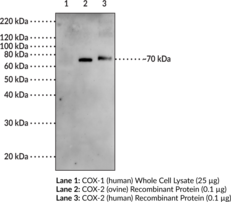Description
The ion channels activated by glutamate that are sensitive to N-methyl-D-aspartate (NMDA) are designated NMDA receptors (NMDAR). The NMDAR plays an essential role in memory, neuronal development and it has also been implicated in several disorders of the central nervous system including Alzheimer’s, epilepsy. and ischemic neuronal cell death. The NMDA receptor is also one of the principal molecular targets for alcohol in the CNS. The rat NMDAR1 (NR1) was the first subunit of the NMDAR to be clonedand it can form NMDA activated channels when expressed in Xenopus oocytes but the currents in such channels are much smaller than those seen in situ. Channels with more physiological characteristics are produced when the NR1 subunit is combined with one or more of the NMDAR2 (NR2 A-D) subunits. Overexpression of the NR2B-subunit of the NMDA receptor has been associated with increases in learning and memory while aged, memory impaired animals have deficiencies in NR2B expression. The NMDAR is also potentiated by protein phosphorylation.
Synonyms: N-methyl-D-aspartate Receptor
Immunogen: fusion protein from the C-terminus of the NR2B subunit of rat NMDA receptor
Formulation: Affinity-purified IgG
Isotype:
Applications: IHC, IP, and WB
Origin: Animal/Rabbit
Stability: 365 days
Application|Immunohistochemistry||Application|Immunoprecipitation||Application|Western Blot||Product Type|Antibodies|Polyclonal Antibodies||Research Area|Neuroscience|Behavioral Neuroscience|Addiction Research||Research Area|Neuroscience|Behavioral Neuroscience|Learning & Memory||Research Area|Neuroscience|Neurodegenerative Disorders|Alzheimer’s Disease||Research Area|Neuroscience|Seizure Disorders


